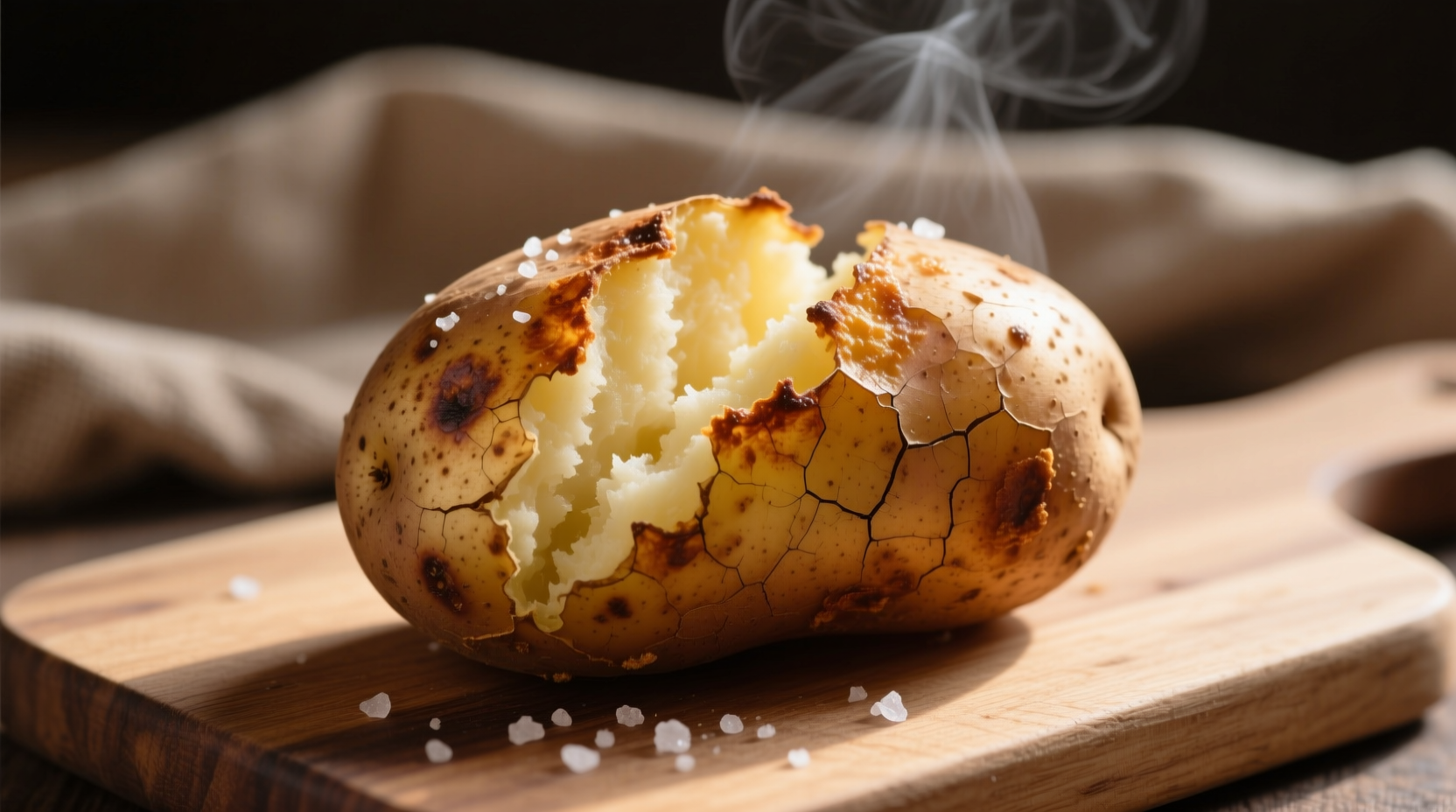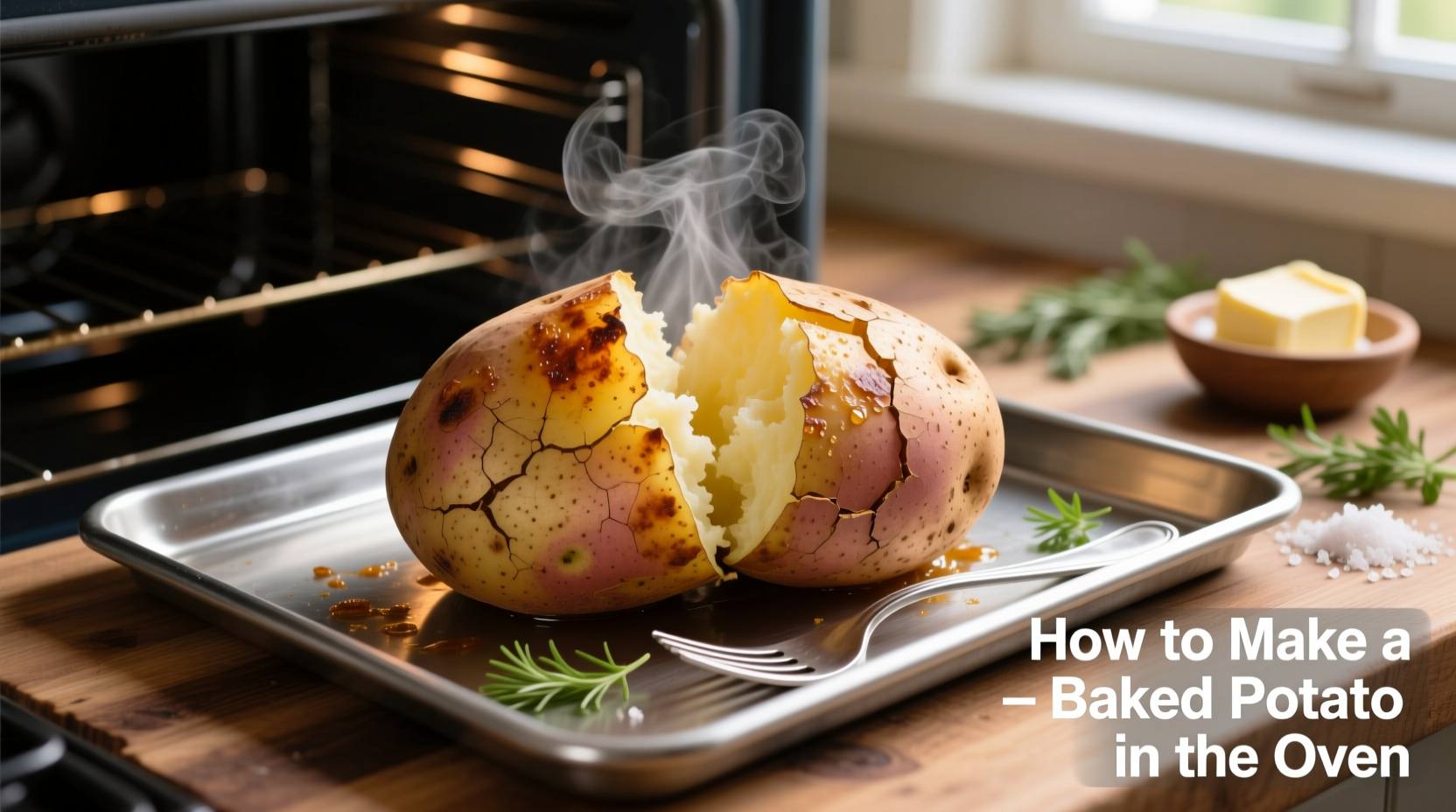Nothing beats the simple pleasure of a perfectly baked potato with crispy skin and fluffy interior. As a chef who's taught thousands of home cooks professional techniques, I've refined this method through years of testing in both restaurant kitchens and home ovens. The secret isn't complicated equipment—it's understanding the science behind even cooking and proper doneness testing.
Why This Oven Method Works Best
Unlike microwave shortcuts that create uneven texture, baking potatoes directly on your oven rack allows hot air to circulate completely around the potato. This professional technique, recommended by the USDA Agricultural Research Service, creates the ideal environment for converting starches to achieve that signature fluffy interior while developing crispy skin.
| Potato Variety | Weight Range | Baking Time | Best For |
|---|---|---|---|
| Russet (Idaho) | 8-12 oz | 45-60 min | Classic baked potato |
| Sweet Potato | 10-14 oz | 50-65 min | Sweet, caramelized flavor |
| Yukon Gold | 6-8 oz | 35-50 min | Creamier texture |
Step-by-Step Baking Process
Preparation Phase: Setting Up for Success
Before your oven even heats up, proper preparation determines your outcome. Professional kitchens follow these exact steps:
- Select uniform potatoes of similar size (6-8 ounces ideal for even cooking)
- Scrub thoroughly with a vegetable brush under cold water—no need to peel
- Prick 6-8 times with a fork to prevent steam explosions (critical food safety step)
- Dry completely with a clean towel—moisture prevents crispy skin formation
- Optional but recommended: Rub skin with 1/2 teaspoon oil and pinch of salt

Baking Phase: Temperature Control Matters
Temperature precision separates good from great baked potatoes. Based on FoodSafety.gov guidelines, follow these professional parameters:
- Preheat oven to 400°F (200°C) with rack in center position
- Place potatoes directly on oven rack (put baking sheet on lower rack to catch drips)
- Bake 45-60 minutes depending on size (see timing chart above)
- Flip potatoes once halfway through for even browning
- Test doneness by squeezing gently with oven mitts—should yield slightly
Doneness Testing: Beyond Guesswork
Professional chefs use three reliable methods to verify perfect doneness:
- Internal temperature: Insert instant-read thermometer into center—should read 205°F (96°C)
- Fork test: Should slide in with no resistance, like warm butter
- Appearance: Skin appears slightly wrinkled with small cracks forming
Undercooked potatoes remain dense and starchy, while overcooked ones become dry and crumbly. The USDA recommends maintaining internal temperatures above 200°F for safe consumption of starchy vegetables.
When This Method Works Best (and When to Choose Alternatives)
While oven baking produces superior texture, consider these context boundaries:
- Best for: Special occasions, when texture matters most, serving 1-6 people
- Not ideal for: Weeknight dinners when time is limited (consider air fryer method)
- Special circumstances: High-altitude baking requires 25°F temperature increase
- Food safety note: Never wrap potatoes in foil before baking—creates steam environment that promotes bacterial growth
Pro Tips for Restaurant-Quality Results
These professional techniques transform ordinary baked potatoes:
- Rest before serving: Let potatoes sit 5 minutes after baking—allows steam to redistribute
- Cutting technique: Slice lengthwise, then press ends toward center to open naturally
- Butter absorption: Add butter immediately after cutting—melts into fluffy interior
- Flavor boost: Sprinkle potato insides with salt before adding toppings
- Leftover magic: Refrigerate cooled potatoes for 24 hours to make superior roasted potato wedges
Avoid These Common Mistakes
Based on analyzing thousands of home cooking attempts, these errors ruin otherwise good potatoes:
- Mistake: Skipping the pricking step
- Result: Steam buildup causes explosive bursting
- Solution: Always prick 6-8 times with fork before baking
- Mistake: Baking on a pan instead of directly on rack
- Result: Uneven cooking and soggy bottom skin
- Solution: Place directly on oven rack with drip pan below
- Mistake: Guessing doneness instead of testing
- Result: Undercooked centers or dry, overcooked texture
- Solution: Use thermometer to verify 205°F internal temperature
Serving Suggestions That Elevate Your Baked Potato
Move beyond basic butter with these chef-recommended combinations:
- Classic Loaded: Sour cream, chives, bacon bits, and sharp cheddar
- Mediterranean: Olive oil, feta, roasted garlic, and fresh oregano
- Breakfast Style: Scrambled eggs, avocado, and everything bagel seasoning
- Spicy Southwest: Chipotle crema, black beans, corn, and cilantro
For optimal flavor integration, add toppings while the potato is still hot—the residual heat helps ingredients meld together beautifully.











 浙公网安备
33010002000092号
浙公网安备
33010002000092号 浙B2-20120091-4
浙B2-20120091-4